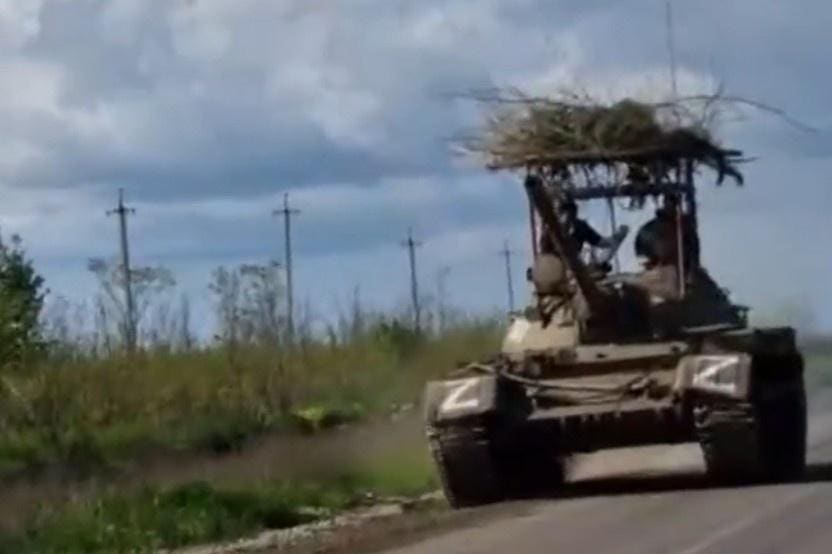The bizarre sight of an obsolete Russian tank rolling down a road in Ukraine while sporting tall anti-drone cage armor is notable not only for the ludicrously tall add-on protection—which undoubtedly limits the tank’s mobility and concealability—but also for the tank underneath the armor.
The tank in the recent video appears to be a T-54B—a model that Soviet industry produced between July 1957 and March 1959 at three factories: two in Russia proper and a third, ironically, in Ukraine.
That is to say, the tank rolling with that six-foot-tall, two-story cage armor—which the Russians clearly hope will block explosives-laden drones barreling down from above—is at least 64 years old. And maybe 66.
That makes it perhaps the oldest tank to appear on the front line in Ukraine. Ukraine’s superupgraded, ex-Slovenian M-55S tanks are a few years older. The typical tank in Russia’s 21-month wider war on Ukraine is a 40-year-old, but upgraded, Ukrainian T-64 or Russian T-72.
The 40-ton, four-person T-54 was the Soviet army’s first post-World War II tank. It’s armed with a D-10T rifled 100-millimeter gun and protected by up t0 200 millimeters of steel; its diesel engine produces at least 500 horsepower.
The original T-54 entered production in 1947; the T-54A followed a few years later. The T-54B improved on the early models by adding a dual-plane stabilizer for the main gun and active infrared night sights for the gunner and commander.
Thinly-protected and lacking modern fire-controls, the T-54 is hopelessly obsolete in 2023. The Kremlin began pulling old T-54s out of long-term storage last spring and rushing them to the front—often without much modification—only after Russian tank losses in Ukraine neared 2,000: a pile of wreckage accounting for nearly half of Russia’s pre-war active tank force.
A determined Ukrainian infantryman with a recoilless rifle easily could knock out a T-54, and the Russians know it. It’s not for no reason that Russian commanders mostly have deployed the nearly 70-year-old tanks as minimally-mobile pillboxes. A T-54 or T-55 can superelevate its D-10T main gun and lob a high-explosive shell out to a range of several miles.
As artillery, a T-54 or T-55 is an expedient. For starters, the D-10T is inaccurate at its maximum ballistic range—and its barrel quickly would wear out under the stress of repeated firing.
Moreover, the lack of passive infrared sights makes a T-54/55 useless at night. To see anything in darkness, the crew would have to switch on the turret-mounted infrared spotlight—and give away the tank’s position to any enemy forces with their own infrared sights.
But a few inaccurate 100-millimeter shells, fired inaccurately at short range, is better than no fire-support at all—and an obvious if imperfect way to mitigate Russia’s escalating artillery crisis.
To keep T-54/55 crews alive on a battlefield buzzing with explosives-laden drones—fearsome anti-tank weapons that the aged tanks’ designers probably couldn’t imagine in the 1940s—Russian technicians have resorted to various welded-on armor kits, including the tall cage evident in the recent video of the T-54B.
The cage could impede tankers trying to bail out of their battle-damaged vehicle. It obviously also makes it harder for the crew to squeeze the tank into a treeline for cover.
But with some luck, it might deflect a Ukrainian drone or two—and keep the seven-decade-old T-54-turned-improvised-howitzer in the fight a little longer.
Read the full article here





